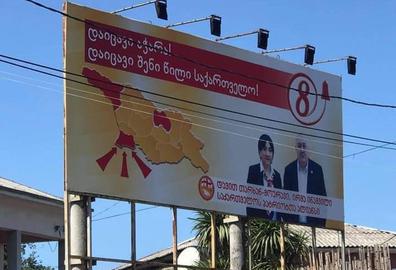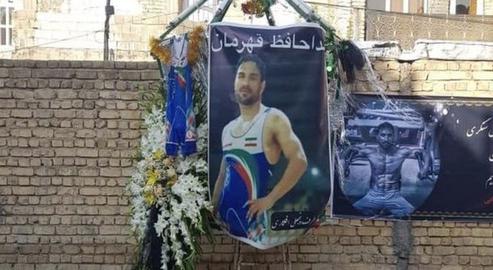Emil Filtenborg and Stefan Weichert are independent journalists based in Ukraine. In a weekly series for IranWire, they examine the landscape of disinformation in Russia and some of the false information that has emanated from the country since the outbreak of coronavirus.
A pro-Russian party in Georgia, the Alliance of Patriots of Georgia, is being bankrolled by Russia ahead of the country’s parliamentary elections, according to a new investigation by the London-based Dossier Center. If true this would mark the latest Russian attempt to influence domestic politics in Georgia, which engaged in a military conflict with Russia and the Russian-backed self-proclaimed republics of South Ossetia and Abkhazia back in 2008.
Eto Buziashvili, a Georgia-based research associate with the Digital Forensic Research Lab under the Atlantic Council, told IranWire that The Alliance of Patriots is reading straight from the Russia playbook by using disinformation to create confusion in the run-up to the vote on October 31, and to spread fear and division among the populace to encourage them to forget about the Russia conflict.
"The party has been using this messaging for many years, and now also in its political campaign," says Buziashvili. "Many people see what they are doing as trying to deceive and lie to the Georgian people. They diversify their sources and repeat them again and again. The fear is that when people hear these messages daily, they will start to believe them."
The standoff between Georgia and Russia has been ongoing for 12 years, with no end in sight. According to the organization Myth Detector, the Alliance of Patriots of Georgia has long portrayed NATO as the real reason for the conflict, while trying to other issues such as strained diplomatic relations with Turkey.
"For a long time, the party has focused on painting a bad picture of NATO and the EU. Now it is more focused on Turkey," says Buziashvili. "The message is that Turkey is an occupying force, but without evidence. It is dangerous because we have, a couple of years ago, seen far-right groups in Georgia attacking people from Turkey or Iran. I cannot show a correlation, but these messages may well fuel xenophobia and physical reactions."
Combining Social Media and Billboards
Trying to paint Turkey as an aggressor is a powerful tool in Georgia. The country has been at war with Turkey in 1921 and before then, with the Ottoman Empire, several times. Some Georgian citizens still believe that Turkey is occupying Georgia or fear that Turkey will do so in the future.
The Alliance of Patriots of Georgia relies on both social media and physical billboards to spread its anti-Turkish messages. Buziashvili believes these messages are an attempt to destroy the diplomatic, economic, and strategic ties between Turkey and Georgia, which have long been a concern for Russia.
One of the party's billboards, for instance, shows a map of Georgia in which its Adjara region is occupied by Turkey, trying to elicit the idea of a looming Turkish invasion. The party has denied that it is hinting at an attack, but says that it referred to the "Turkey's economic and ideological expansion" into Georgia.
On social media, according to an analysis of Facebook’s Ad Library, eight out of nine political adverts by The Alliance of Patriots of Georgia have been anti-Turkish in nature, with accusations that Turkey is occupying Georgian territories and plans to occupy the whole of Georgia. While some Turkish regions used to be part of Georgia, this was hundreds of years ago and dates back to an invasion by the Ottoman Empire.
"They also rely on going door to door to create interpersonal relations," says Buziashvili. "They attend birthdays and weddings, and create official gatherings. They are becoming more and more active, all with the same goal of establishing a better relationship with Russia."
Russian Techniques Honed in Georgia
Fear and historical referents are two of the most common features in both contemporary Russian disinformation and the history of propaganda. IranWire has previously disclosed how Vladimir Putin used a selective reading of historical events to support a false claim about Russian's role in WW2. The Alliance of Patriots of Georgia, Buziashvili says, has used the history of the Ottoman Empire in the same manner to wrongly focus public attention on Turkey.
The Ukrainian project StopFake has previously surmised that Russian disinformation often uses what it identifies as the 4D Approach. This consists of four points: to dismiss something, to distort the message, to distract away from it, and to dismay by saying that to oppose Russia's state narrative could have dire consequences.
According to Buziashvili, The Alliance of Patriots of Georgia is relying on both 'distort' and 'distract' in the parliamentary election in Georgia. " If you do not like the facts, you turn them upside down,” he says. “This is what The Alliance of Patriots of Georgia is doing. Or, it complains that others are doing the same thing – which is a way to distract our attention away from the real threat to Georgia, which is Russian and not Turkish."
IranWire contacted The Alliance of Patriots of Georgia for comment, but the party did not respond.
Also in this series:
Missing Data, Mud-Slinging and “Miracle Cures”: Why Disinformation Is Bad For Your Health
Iranian Online Network Still Peddling Coronavirus Disinformation
Putin’s Domestic Problems Eclipse Russian Disinformation Campaigns
China's Campaign to Protect President Xi against Coronavirus Criticism
Chinese Embassies Work Overtime to Diffuse International Fury Over Coronavirus
Russia Bans Coronavirus "Fake News" and Slams US Over Press Freedom
China Blocks Investigations Amid Refusal to Shut Down Wet Markets
From Coronavirus to the Second World War: On the Frontlines of the Russian Disinformation Battle
Russia Blames West for Propaganda While Reporting Unlikely Number of Covid-19 Deaths
As Criticism of China Falters, Time for a NATO for Human Rights?
Guest Post From Russia: How do You Put the Brakes on a Fake News Machine?
Has China Really Given Assent to a Global Coronavirus Review?
Russian Disinformation Back to Targeting Ukraine as Putin Declares Covid-19 Peak has Passed
Will the Post-Coronavirus World Stand Up to China's Bullying Business Tactics?
Coronavirus: An Opportunity to Advance Russian Interests in Latin America
The Shi Zhengli Identification Criteria: How Do We Know Where Coronavirus First Emerged?
Covid-19 and Black Lives Matter Unrest Targeted by Russian Disinformation
Occupy First, Talk Later: China Turns Border Conflict Into PR Opportunity
China Deploys Coercive Tactics to Deal with Disinformation Accusation
Putin Tries to Rewrite War History to Assert Russia's Position on the World Stage
Behind the Smokescreen: What are China’s Anti-EU Pandemic Narratives Really About?
Kremlin Has the Upper Hand as Covid-19 Puts Independent Media Under Pressure
Russian Media Takes Aim at Belarus Protesters and Claims Germany Poisoned Navalny
visit the accountability section
In this section of Iran Wire, you can contact the officials and launch your campaign for various problems

























comments